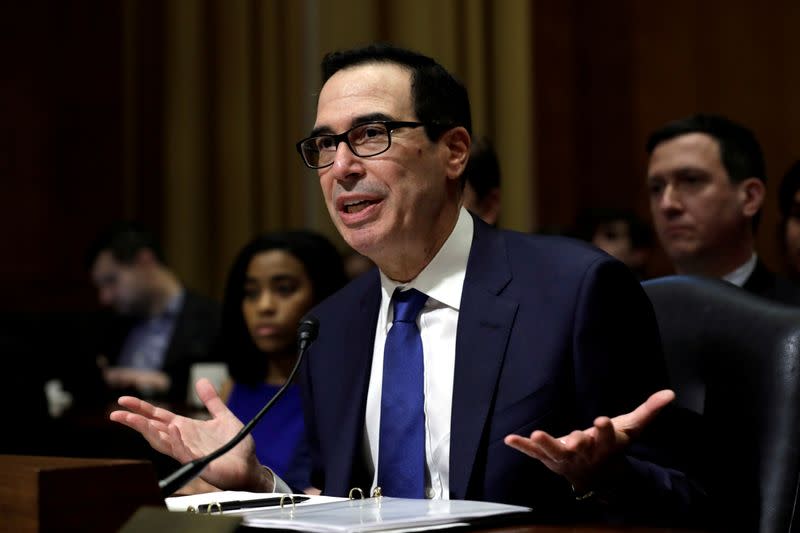What's in the nearly $2 trillion U.S. Senate coronavirus stimulus

WASHINGTON (Reuters) - The U.S. Senate on Monday was negotiating a nearly $2 trillion emergency bill that aims to stem some of the economic toll of the coronavirus pandemic.
The talks remain fluid after Democrats pushed back against an initial Republican draft of the bill on Sunday, and officials in both parties said that final numbers would be known only after the talks are resolved.
Below are some details currently under negotiation, which would need to be passed by the Republican-controlled Senate and the Democratic-controlled House of Representatives before going to President Donald Trump for his signature:
- About $500 billion in direct payments to people, in two waves of checks of up to $1,200 per individual making up to $75,000 a year. Additional payments for families with children could push the total to $3,000 for a family of four, according to Treasury Secretary Steven Mnuchin, who has played a key role in the negotiations.
- Some $350 billion in loans to small businesses, according to Republican Senator Marco Rubio, chairman of the Senate Small Business Committee.
- Up to $500 billion in "liquidity assistance" for distressed industries. That figure would include $58 billion for airlines, Republicans say. Last week, Republicans proposed $150 billion for other industries, but Democrats say the Republican request grew over the weekend. Democratic Senator Chris Coons said on Monday he wanted to see an accountability board installed to oversee the "up-to-$500 billion" fund.
- At least $75 billion for hospitals. Republicans say they have agreed to that amount. Hospitals sought $100 billion, and Senate Democratic leader Chuck Schumer has been pushing for a "Marshall Plan" for them.
- Some $250 billion for expanding unemployment insurance. Republicans say they agreed to that in response to Democratic demands.
- Over $10 billion for drug development, and $4 billion for masks, gloves, gowns and ventilators, Republican Senator Steve Daines said.
- Democrats want a large fund to help state and local governments, according to the Senate's No. 2 Democrat, Dick Durbin.
- House Speaker Nancy Pelosi, a Democrat, unveiled her own lengthy proposal on Monday. It included billions to help states conduct elections by mail. It also would make coronavirus treatment free for patients and limit stock buybacks for corporations getting government aid.
(Reporting by Susan Cornwell and David Morgan; Additional reporting by Tracy Rucinski in Chicago; Editing by Scott Malone and Peter Cooney)